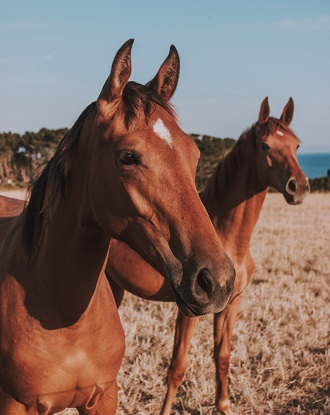EHV-1 virus is highly contagious and spreads via aerosolized secretions
A horse from Clackamas County
recently tested positive for Equine Herpesvirus (EHV-1). After exhibiting neurologic symptoms, the owners called a private veterinarian to examine the animal and collect a sample for testing. The horse was later humanely euthanized.
A California Laboratory confirmed EHV-1 on May 31. EHV-1 is a reportable disease, and veterinarians are legally responsible for immediately reporting all suspected cases to the Oregon Department of Agriculture (ODA).
The horse owner reports the animal recently traveled to the 2022 State Oregon High School Equestrian (OHSET) Teams Championship. OHSET was held at the First Interstate Bank Expo Center in Redmond, Oregon, from May 12-15.
A second horse from the same ranch who also traveled to OHSET is doing well, recovering from initial respiratory symptoms. However, an ODA District Veterinarian placed a quarantine on the farm following state and national guidelines.
The ODA State Veterinarian is working with OHSET to evaluate the potential exposure risk at the state event, and event coordinators are working to contact exhibitors. All horse owners who believe that their horse may have been exposed to EHV-1 should monitor their animal’s temperature twice daily and call their veterinarian if they see any symptoms.
The EHV-1 virus is highly contagious and spreads via aerosolized secretions from infected coughing horses, direct and indirect contact with nasal secretions, and fetal fluids. EHV-1 typically has an incubation period of 2-10 days. Respiratory shedding of the virus generally occurs for 7-10 days but may persist longer in infected horses.
A D V E R T I S E M E N T

A D V E R T I S E M E N T
Following basic biosecurity practices is an essential factor in reducing the risk of exposure to all contagious equine diseases. Basic biosecurity measures to follow to decrease potential disease spread at equine events include:
- Limit horse-to-horse contact
- Limit horse-to-human-to-horse contact
- Avoid the use of communal water sources
- Avoid sharing of equipment unless thoroughly cleaned and disinfected between uses
- Isolate new or returning horses from others for 30 days
- Monitor your horse for clinical signs of disease and report any temperature over 102°F to a veterinarian
You can find more information about
Equine Herpesvirus online.
--Bruce Armstrong| Post Date: 2022-06-03 08:51:16 | Last Update: 2022-06-03 09:42:20 |







